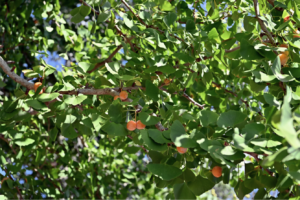
Source: 小石川人晃, CC BY-SA 4.0 via Wikimedia Commons
Ginkgo biloba (Ginkgoaceae) is one of the oldest living species on the earth, dating back approximately 270 million years. A single tree can live as long as 1,000 years and grow to a height of 120 feet. Ginkgo leaves contain special alkaloids called ginkgolides and one called bilobalide and two types of chemicals, flavonoids and terpenoids, which are believed to have potent antioxidant properties. The chemical composition of this plant makes it a very powerful tool against numerous disorders, particularly those associated with degenerative aging and impaired microvessel blood flow. Chinese herbal texts mention the use of ginkgo as a remedy for lung problems as far back as 1436. Gingko was one of the only plants to survive the nuclear bomb dropped on Hiroshima in Japan during World War II.
Ginkgo has beenshown to significantly increase blood flow in all organs and tissues, including the brain and heart muscle. It assists in bringing oxygen to the brain and has been shown to improve memory, concentration, mental alertness and mild mood disorders. A number of studies have found that ginkgo has a positive effect on memory and thinking in people with Alzheimer’s or vascular dementia. A 1997 study in the Journal of the American Medical Association concluded that ginkgo extract was effective in treating patients in the early stages of dementia associated with Alzheimers disease.6
Ginkgo is currently licensed in Germany for the treatment of cerebral dysfunction (short-term memory problems, dizziness, tinnitus) mainly in older people, and is used for heart and eye diseases, as well as accidents involving brain trauma.6
Laboratory studies have shown that ginkgo improves blood circulation by dilating blood vessels and reducing the stickiness of blood platelets. It has been shown to be effective in preventing oxidation of LDL cholesterol, inhibiting arrhythmia in heart muscle and in the treatment of glaucoma/macular degeneration, chronic fatigue syndrome, seasonal affective disorder (SAD) and sexual dysfunction.
Precautions: do not eat Ginkgo biloba fruit or seed.The safety of ginkgo in pregnant/nursing women and children is unknown and therefore is not advised.
Possible Interactions between ginkgo and prescription medications:
Gingko has about the same anticoagulating effect as one aspirin; therefore it is important not to combine with anticoagulant drugs. Avoid combining this herb with seizure medications (anticonvulsants), antidepressants (selective serotonin reuptake inhibitors – SSRIs), high blood pressure medications, aspirin, Ibuprofen, insulin and other diabetes drugs.
REFERENCES
1Christopher, John R., Herb Syllabus, Master Herbalist Guide. Utah: Christopher Publications, 2010.
2Tillotson, Alan Keith, The One Earth Herbal Sourcebook. New York: Kensington Publishing, 2010.
3Universtiy of Maryland Medical Center web site: www.umm.edu/altmed/articles/ginkgo-biloba-000247.htm.
4”What is Gingko?” About.com.
5http://altmedicine.about.com/cs/herbsvitaminsek/a/Ginkgo.htm
6Trivieri, Jr., Larry and Anderson, John W., Alternative Medicine – The Definitive Guide, New York: Crown Publishing, 2002.
No Comments Yet